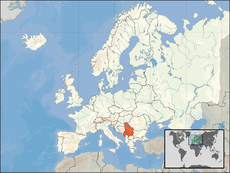
The member states of the United Nations comprise 193 sovereign states. The United Nations (UN) is the world's largest intergovernmental organization. All members have equal representation in the UN General Assembly.
Succession of states is a concept in international relations regarding a successor state that has become a sovereign state over a territory that was previously under the sovereignty of another state. The theory has its roots in 19th-century diplomacy. A successor state often acquires a new international legal personality, which is distinct from a continuing state, also known as a continuator or historical heir, which despite changes to its borders retains the same legal personality and possess all its existing rights and obligations.

The Russian Federation continued to use the Soviet Union's seat, including its permanent membership on the Security Council in the United Nations after the 1991 dissolution of the Soviet Union, which originally co-founded the UN in 1945. The continuity was supported by the USSR's former members and was not objected to by the UN membership; Russia accounted for more than 75% of the Soviet Union's economy, the majority of its population and 75% of its land mass; in addition, the history of the Soviet Union began in Russia with the October Revolution in 1917 in Petrograd. If there was to be a continuator to the Soviet seat on the Security Council among the former Soviet republics, these factors made Russia seem a logical choice.

United Nations Security Council resolution 1244, adopted on 10 June 1999, after recalling resolutions 1160 (1998), 1199 (1998), 1203 (1998) and 1239 (1999), authorised an international civil and military presence in the Federal Republic of Yugoslavia and established the United Nations Interim Administration Mission in Kosovo (UNMIK). It followed an agreement by Yugoslav President Slobodan Milošević to terms proposed by President of Finland Martti Ahtisaari and former Prime Minister of Russia Viktor Chernomyrdin on 8 June, involving withdrawal of all Yugoslav state forces from Kosovo.

As of 23 January 2025, there are 193 member states in the United Nations (UN), each of which is a member of the United Nations General Assembly.
The Arbitration Commission of the Conference on Yugoslavia was an arbitration body set up by the Council of Ministers of the European Economic Community (EEC) on 27 August 1991 to provide the conference on Yugoslavia with legal advice. Robert Badinter was appointed to President of the five-member Commission consisting of presidents of Constitutional Courts in the EEC. The Arbitration Commission has handed down fifteen opinions on "major legal questions" raised by the conflict between several republics of the Socialist Federal Republic of Yugoslavia (SFRY).

Teams from Yugoslavia first participated at the Olympic Games in 1920. Previously, several athletes from Croatia, Slovenia and northern Serbian province Vojvodina had competed for Austria or Hungary when those countries were part of the Empire of Austria-Hungary. A small team of two athletes had competed distinctly for Serbia at the 1912 Summer Olympics.

The former State Union of Serbia and Montenegro was represented at the Olympic Games on six occasions between 1996 and 2006, when the union was dissolved and Montenegro and Serbia each declared full independence.

The national flag of Serbia and Montenegro was originally adopted on 27 April 1992 as the flag of the Federal Republic of Yugoslavia and was used until 2006. After the country was renamed to the State Union of Serbia and Montenegro in February 2003, it remained in use as the national flag until the country's dissolution in June 2006.
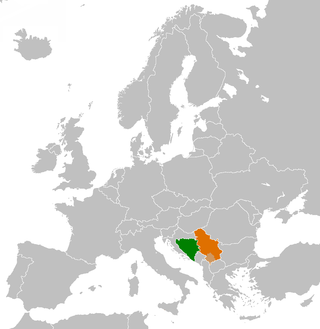
The modern-day countries of Bosnia and Herzegovina and Serbia both originated from Yugoslavia. The majority of population in both countries speak one of the standard varieties of Serbo-Croatian and Serbia is one of the largest investors in Bosnia and Herzegovina.

United Nations Security Council resolution 787, adopted on 16 November 1992, after reaffirming Resolution 713 (1991) and all subsequent resolutions on the topic, the council called upon the parties in Bosnia and Herzegovina to consider the draft outline constitution as a basis for negotiating a political settlement of the conflict in the country, and went on to impose further international sanctions on the Federal Republic of Yugoslavia.

United Nations Security Council resolution 821, adopted on 28 April 1993, after reaffirming Resolution 713 (1991) and all subsequent resolutions, the council also recalled resolutions 757 (1992), 777 (1992) and General Assembly Resolution 47/1 (1992) which stated that the state formerly known as the Socialist Federal Republic of Yugoslavia had ceased to exist and that it should apply for membership in the United Nations and until then should not participate in the General Assembly.
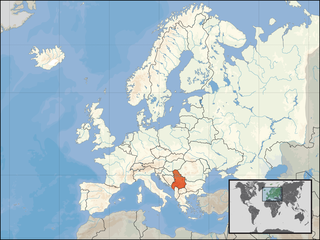
United Nations Security Council resolution 1326, adopted without a vote on 31 October 2000, after examining the application of Federal Republic of Yugoslavia for membership in the United Nations, the Council recommended to the General Assembly that Yugoslavia be admitted.
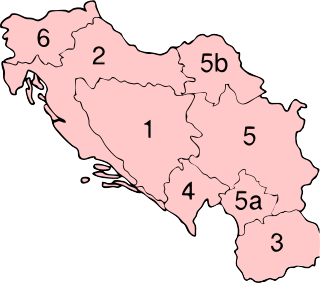
United Nations Security Council resolution 1022, adopted on 22 November 1995, after recalling all resolutions on the conflicts in the former Yugoslavia, the Council suspended measures in previous resolutions related to the former Yugoslavia.

As of July 2023, UNESCO members include 194 member states and 12 associate members. Some members have additional National Organizing Committees (NOCs) for some of their dependent territories. The associate members are non-independent states.
United Nations General Assembly Resolution 47/1 was adopted on 22 September 1992 following Security Council Resolution 777. The resolution decided that Serbia and Montenegro could not continue the membership of the former Socialist Federal Republic of Yugoslavia but must join as new members if they wished to participate in the United Nations.
Serbia joined the United Nations on November 1, 2000, as the Federal Republic of Yugoslavia. The previous Yugoslav state was one of the original 51 member states of the United Nations.

Democratic Federal Yugoslavia was a charter member of the United Nations from its establishment in 1945 as the Socialist Federal Republic of Yugoslavia until 1992 during the Yugoslav Wars. During its existence the country played a prominent role in the promotion of multilateralism and narrowing of the Cold War divisions in which various UN bodies were perceived as important vehicles. Yugoslavia was elected a non-permanent member of the United Nations Security Council on multiple occasions in periods between 1950 and 1951, 1956, 1972–1973, and 1988–1989, which was in total 7 years of Yugoslav membership in the organization. The country was also one of 17 original members of the Special Committee on Decolonization.
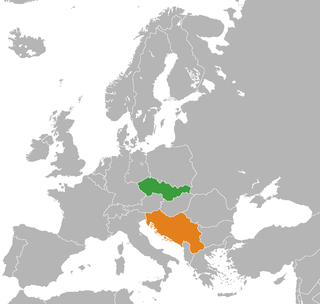
Czechoslovakia–Yugoslavia relations were historical foreign relations between Czechoslovakia and Yugoslavia, both of which are now-defunct states. Czechoslovakia and the Kingdom of Serbs, Croats and Slovenes were both created as union states of smaller Slavic ethnic groups. Both were created after the dissolution of Austria-Hungary, itself a multinational empire unable to appease its Slavic populations or implement a trialist reform in its final years.

The Agreement on Succession Issues of the Former Socialist Federal Republic of Yugoslavia is an international agreement on shared state succession of the Socialist Federal Republic of Yugoslavia reached among its former constituents republics following the breakup of the country in early 1990s.
